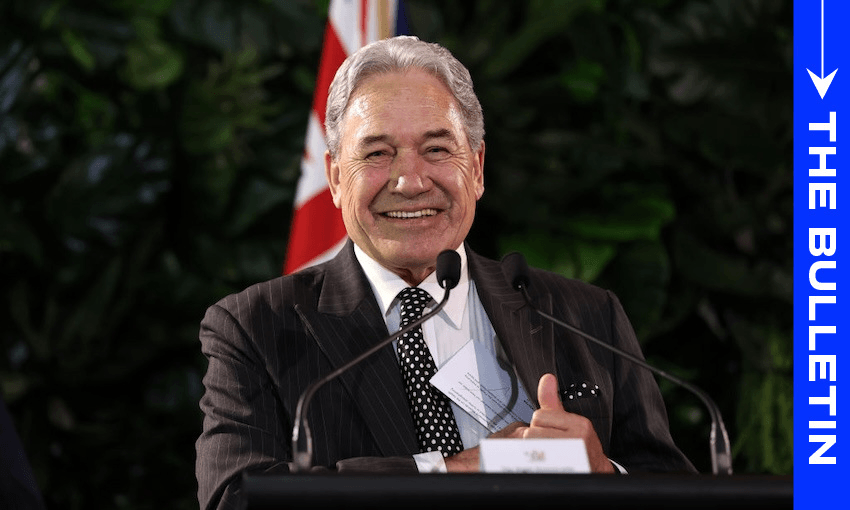The party has leapfrogged the Greens for the first time in years, buoyed by a weakened opposition and a newfound sense of stability in government, writes Catherine McGregor in today’s extract from The Bulletin.
To receive The Bulletin in full each weekday, sign up here.
NZ First surges ahead
New Zealand First’s latest poll result marks a milestone moment in the party’s unpredictable history. Yesterday’s Taxpayers’ Union–Curia poll has Winston Peters’ party at 9.8% – its highest figure in a mainstream poll since August 2017 and the first time it has overtaken the Greens since a single poll in April 2020. It’s a sharp jump of over three points from the previous poll in June and puts NZ First firmly in third place, ahead of both the Greens and Act, RNZ reports. For Peters, who just handed the deputy prime ministership to Act’s David Seymour, the result is vindication that he still knows how to read the political room. If repeated at an election, NZ First would add four seats to its tally and become a powerbroker once again, showing remarkable resilience in an MMP environment where small coalition partners usually fade.
A rare moment of stability
For decades, Winston Peters’ career has been defined by big swings – in, out, and back again. As Luke Malpass notes in The Post (paywalled), Peters has never clung to government by switching allegiances immediately after a loss; rather, his party has bounced between power and oblivion. What makes this term different is that NZ First isn’t fighting for its life. Instead, it has found an unusual patch of stability, consistently polling above the 5% threshold.
This resilience comes in part from the struggles of its rivals: the Greens have edged leftwards into what Malpass calls a more “Trotskyite hue”, and Te Pāti Māori’s assertive agenda has unsettled some swing voters. Meanwhile, Labour’s long road back to credibility – particularly in Auckland – has left gaps for NZ First and Act to fill. The result is a coalition where Peters’ party, for once, looks comfortably secure rather than holding on by its fingernails. “This time, the run-up to the election looks likely to be from a position of stability and relative strength,” writes Malpass. “Can he finally get two terms in a row?”
Freedom to criticise
A key reason for NZ First’s steady numbers is the unusual freedom minor partners have enjoyed this term. As Dan Brunskill highlights in Interest.co.nz, Peters and Seymour have both had room to air differences and push back on the major party line, something rarely tolerated in past coalitions. The recent spat between Peters and Christopher Luxon over how to frame the “trade war” with the US is a prime example. While Luxon described the growing US–China tariff standoff in stark terms, Peters publicly scolded him for “hysterical” rhetoric, arguing for careful “quiet diplomacy” instead. Far from hurting NZ First, this independent streak has reminded supporters what they like most about the veteran politician. Backed up by savvy social media – including a stream of punchy, conflict-heavy YouTube videos – the party’s base sees a leader unafraid to stand up to power, even when he’s part of it.
Hot-button bills keep NZ First in the spotlight
While Peters’ personality is still NZ First’s strongest weapon, the party’s steady stream of headline-grabbing member’s bills keeps its brand firmly in the culture war trenches. From proposals to define “woman” in legislation to restricting DEI language in the public service, these moves play directly to its socially conservative base. Its latest proposal, however – to force retailers to accept cash for transactions up to $500 – broadens that pitch. Ostensibly aimed at protecting the elderly and rural communities, the bill also appeals to those wary of their privacy being eroded in an increasingly digital economy.
Another less-noticed recent member’s bill would ban any flag but the official New Zealand flag from government buildings – a neat dog-whistle to voters fatigued by what Peters calls “cultural, woke, or divisive political ideology”. If the current polling holds, these stances could help Peters do what he’s never done before: bring NZ First back for a second consecutive term in government.



